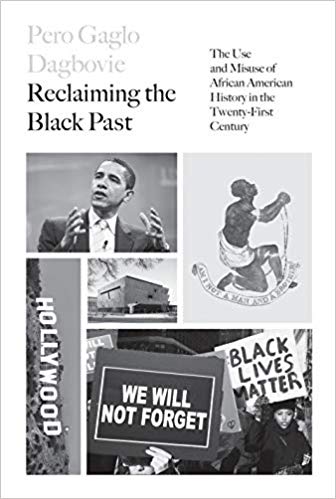The Book
Reclaiming the Black Past: The Use and Misuse of African American History in the Twenty-First Century (London: Verso Books, 2018)
The Author(s)
Pero Gaglo Dagbovie

The historian Pero Dagbovie has devoted his career to chronicling the idea of African American history. His earlier works, covering the rise and development of African American history, as well as the importance of Carter G. Woodson to that story, are all essential works for anyone studying the growth of this historical field. Now, Dagbovie has delivered a critical work for understanding African American history today: that is, how in recent years African American history has been publicly consumed and, in turn, shaped by the public.
Reclaiming the Black Past: The Use and Misuse of African American History in the Twenty-First Century reads with a sense of urgency, as Dagbovie tries to alert readers to how African American history has been portrayed in numerous ways in the first two decades of the century. “Contemporary black culture,” writes Dagbovie, “permeates through American life, but black history does not explicitly shape most Americans’ worldviews” (vii). Throughout Reclaiming the Black Past, there is a near-constant tension between the work being done by scholars in African American history, and the myriad ways in which the public consumes, debates, and understands African American history.
The choices Dagbovie makes in Reclaiming the Black Past to understand how the public engages with African American history are not only sensible but should bear closer examination by other intellectual historians. For instance, his “analyzing Obama as an intellectual” (1) is, in some ways, a follow up to the work done by James Kloppenberg in Reading Obama (2010). Where Kloppenberg carefully examined the kinds of works Obama has read and analyzed before his presidency, Dagbovie pivots to taking care to critically engage with public statements on African American history by Obama during his presidency. Dagbovie showcases how President Obama used a keen understanding of African American history to speak to as broad of an audience as possible of American citizens—a conversation that when analyzing, Dagbovie points out, it “is essential to recognize to whom he was speaking and the specific circumstances and context” (15).
Context proves to be king in Reclaiming the Black Past. Dagbovie’s analysis of Hollywood’s treatment of African American history is an example of this. Weighing the cultural relevance, reception, and legacy of films such as The Help, Django Unchained, 12 Years a Slave, and Selma Dagbovie points out how each film touched off a cultural debate over the presence of African Americans within American culture—and American history. The intersection of intellectual and cultural history comes alive numerous times in Reclaiming the Black Past. For Dagbovie, the two cannot be divorced when analyzing the public consumption of African American history.
The tension between the public and the academic versions of African American history especially come to the fore when Dagbovie considers the long debate about the continuing necessity of Black History Month. He makes it clear that this is a long-standing debate, one as old as Negro History Week—which started in 1926 and became Black History Month in 1976—itself. In addition, Dagbovie’s chapter on African American comedians using a mixture of humor and popular historical analysis bears looking at for anyone studying the public’s perception of African American history at the turn of the twenty-first century.
Reclaiming the Black Past provides a useful model for thinking about history in a public, and contemporary, context. In some ways, it is reminiscent of Jonathan Holloway’s Jim Crow Wisdom (2013). Both books tackled the ways in which African Americans debated, taught, and analyzed their own history in a public context. They can certainly be read in conversation with one another. When considering the modern stakes of intellectual history—how it shapes public policy, cultural debates, and national conversations—then Reclaiming the Black Past takes on an additional, urgent context of speaking to ongoing debates about history in the public sphere.

0